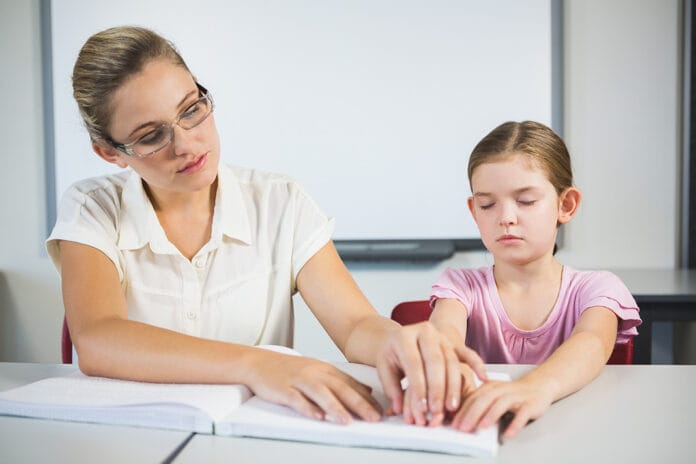Appropriate dental care in children with disabilities can seem overwhelming, and not just for the parents. Their dental health is a major concern because, as we all know, the state of our mouths contributes directly to our physical and mental stability.
Much scientific study has been dedicated to the needs of children with developmental disabilities because many of these children can’t individually or physically complete the necessary tasks essential for proper care. A Prospective Case-Control Study to Evaluate Oral Health Status Before and After Intervention Using Different Dental Aids in Children with Visual Impairment specifically addresses children with full cognitive function that live with a disruption in one of their major senses.
Do children with various levels of visual deprivation approach oral health routines differently? Does the severity of their problem change their approach to personal hygiene?
The Study
Compared with children of average ability and of similar age, 45 children of varying visual impairments were placed into three subgroups within the study. Each child was placed within a sub-group. Those with both affected and average abilities were separated into subgroups where they were assigned either the solitary use of manual toothbrushes, the use of a manual toothbrush and medicated mouthwash, or the use of a powered toothbrush alone.
Each child was given a basic dental exam to determine their current oral health status and discuss their current dental hygiene practices. Then each child, individually, was given instruction on how to effectively use their assigned hygiene tools and establish a hygiene schedule based upon healthy standards and individual needs.
The children were reexamined at one, three, and six months and the results were documented, and the children were re-introduced to the correct procedures, as we do for every child’s preventative appointments. The results were not all that surprising.
Differentiated Learning
There is something about our vision that affects our salivary flow, and the less we are able to see, the less saliva we have to aid us in keeping our mouths biologically and chemically balanced. Depression, anxiety, headaches, and other side effects of having a visual disability have been proven to affect a person’s level of personal hygiene as a whole.
Children learn by various means. Differentiated learning refers to using all the child’s senses to teach them a lesson in the most effective way. When one of those senses isn’t fully developed, then we have to amp up attention and focus more on getting information through in other ways.
Most importantly, our teaching methods tend to be more on the visual side, rather than showing our patients how they can use all of their senses to create and maintain a routine. Once these children were taught how to use what they have to complete their dental routines effectively, all the children’s dental health scores improved as long as they followed the program.
Many of our offices support and suggest powered toothbrushes as more effective than manual toothbrushes. For kids, this is a given because of the appeal of using something akin to a power tool. It’s like using a power washer for the first time. It’s exciting and can become a fun responsibility if presented the right way.
What helped these children out the most was using mouthwash. Chlorhexidine seemed to truly help these children decrease plaque, gingivitis, and caries. The medicated mouthwash can get right into those places that our brushes and hands cannot. The visually impaired kids can feel the liquid in their mouths better than the bristles on their teeth.
Teaching By Touch
A quarter of a million people suffer from some sort of serious visual impairment, and the way we approach our teaching methods in the office should not always be based on visual practices. We need to be able to communicate effectively with our visually impaired patients, especially when they are young.
Finding new, novel ways of teaching hygiene techniques by touch, instead of by what they see in the mirror, is essential for their quality of life and the effectiveness of the preventative measures that we take and help them learn.
Brushing alone is great, but studies keep showing that the consistent use of mouthwash really ups the game for these special kids.











